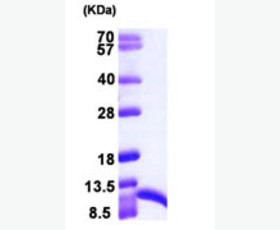Recombinant Mouse Interferon γ/IFNγ
| Product name: | Recombinant Mouse Interferon γ/IFNγ |
| Source: | E.coli |
| Purity: | Greater than 95% as determined by reducing SDS-PAGE. |
| Buffer Formulation: | Lyophilized from a 0.2 μm filtered solution of 20mM Tris,150mM NaCl,pH8.0. |
| Applications: | Applications:SDS-PAGE; WB; ELISA; IP. |
| Storage: | Avoid repeated freeze/thaw cycles. Store at 2-8 oC for one month. Aliquot and store at -80 oC for 12 months. |
| UOM: | 100ug/50ug/200ug/1mg/1g |
| Source | E.coli |
| Description | Recombinant Mouse Interferon gamma is produced by our E.coli expression system and the target gene encoding His23-Cys155 is expressed. |
| Names | Ifng,Interferon gamma,IFN-gamma |
| Accession # | P01580 |
| Formulation | Lyophilized from a 0.2 μm filtered solution of 20mM Tris,150mM NaCl,pH8.0. |
| Shipping |
The product is shipped at ambient temperature. |
| Reconstitution |
Always centrifuge tubes before opening. Do not mix by vortex or pipetting. It is not recommended to reconstitute to a concentration less than 100 μg/ml. Dissolve the lyophilized protein in ddH2O. Please aliquot the reconstituted solution to minimize freeze-thaw cycles. |
| Storage |
Lyophilized protein should be stored at < -20°C, though stable at room temperature for 3 weeks. Reconstituted protein solution can be stored at 4-7°C for 2-7 days. Aliquots of reconstituted samples are stable at < -20°C for 3 months. |
| Purity |
Greater than 95% as determined by reducing SDS-PAGE. |
| Endotoxin | Less than 0.1 ng/µg (1 IEU/µg) as determined by LAL test. |
| Amino Acid Sequence |
MHGTVIESLESLNNYFNSSGIDVEEKSLFLDIWRNWQKDGDMKILQSQIISFYLRLFEVLKDNQA ISNNISVIESHLITTFFSNSKAKKDAFMSIAKFEVNNPQVQRQAFNELIRVVHQLLPESSLRKRK RSRC
|
| Background | Mouse Ifng is a secreted protein which belongs to the type I I (or gamma) interferon family. IFNG is produced by lymphocytes and activated by specific antigens or mitogens. In addition to having antiviral activity, IFNG also has important immunoregulatory functions. It is a potent activator of macrophages and has antiproliferative effects on transformed cells. It can potentiate the antiviral and antitumor effects of the type I interferons. Genetic variation in IFNG is associated with the risk of aplastic anemia (AA) which is a rare disease in which the reduction of the circulating blood cells results from damage to the stem cell pool in bone marrow. In most patients, the stem cell lesion is caused by an autoimmune attack. T-lymphocytes, activated by an endogenous or exogenous, and most often unknown antigenic stimulus, secrete cytokines, including IFN-gamma, which would in turn be able to suppress hematopoiesis. |














